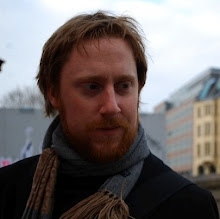"There is no one on earth who will not die.
Even now, one after another they pass away.
I also will die very soon,
And yet like and idiot, I prepare to live for a long time.
Guru, think of me; look upon me quickly with compassion.
Grant your blessings so that I curtail my worthless schemes."
-Jamgon Kongtrul Lodro Thaye
Crying to the Gurus from Afar, stanza 31
The Buddhist outlook can seem so bleak sometimes. Depending on how you choose to read it, one can easily find a distastefully heavy emphasis on the inescapable crappiness of life. In truth, this heavy-handedness is presented in conjunction with an deeper, overriding, positive point. It is meant as a precursor to the observation that all suffering is caused by mental clinging, and that without clinging there is no ground for suffering to arise. Though initially confusing, this observation is predominantly considered to be very good news. Nonetheless, there are always those moments when only the bleak precursor comes across.
-----
I've started thinking about calculus again. I'd love to do a proper computer science degree sometime, with all the linear geometry and lambda functions I can take. That would be fun. Think of the code I could turn out then!
I want to go to Spain again to exercise my linguistic skills. After that, possibly I'll hide out in Paris until I can speak enough French to read
The Possessed without missing all of those bon mots Stepan Trofimovitch breaks out. Then there's Mandarin and Hindi, both incredibly useful. Not to mention beefing up on my Tibetan ... It all just takes time and resources.
A part of me has always wanted to raise trees. They take so long to grow. It forces you to operate on a different, slower timeline; a refreshing prospect in the speedy context of my current life.
Then there are the things I'm actually getting done: living in a single city long enough to truly savor all of its creative ferment, starting a company, finally getting around to dating more guys, taking up weight lifting purely out of curiosity, making more art, tasting more wine, dancing all night at least once a month, eating all the tasty food I can find.
When viewing life from this perspective, all that Buddhist advice I've become so familiar with seems completely foreign. I want to live a full life, and I think I'm doing a pretty good job of it, but inevitably I come back to a conflict of role models.
All of the people who I truly admire consistently seem to have found happiness as a result of sacrifice. More to the point, they have all sustained their hapiness through simplicity. I really believe this. I admire it, and (I think) I aspire to it. So why is it that rather than embracing a simple life I drive towards further elaboration?
I get some mileage out of the observation that simplicity, as it pertains to achieving and sustaining happiness, is a mental state rather than a physical or social condition. Buddhist practice would be pretty worthless if it only worked for people hiding on mountain tops. Nonetheless, I seriously doubt whether I am truly making an effort.
Frankly, it disturbs me to know the depth of my potential for laziness and frivolous distraction. I tried to hide from that by living at a monastery, riding on the shirttails (or robetails) of people who were more determined than me. It didn't take long to see what a disastrous failure that promised to be. Even then, I continued to cling to it for all of the standard reasons why we cling to unnecessary crutches.
Now I've broken loose yet again, hoping that the increased contrast will bring some newfound focus.
"'Man fears death because he loves life. That's how I understand it,' I observed, 'and that's determined by nature.'
'That's abject; and thats where the deception comes in.' His eyes flashed. 'Life is pain, life is terror, and man is unhappy. Now all is pain and terror. Now man loves life, because he loves pain and terror, and so they have done according. Life is given now for pain and terror, and that's the deception. Now man is not yet what he will be. There will be a new man, happy and proud. For whom it will be the same to live or not to live, he will be the new man. He who will conquer pain and terror will himself be a god. And this God will not be.'"
-Fyodor Dostoyesky
The Posessed, Chapter III, Scene VIII

